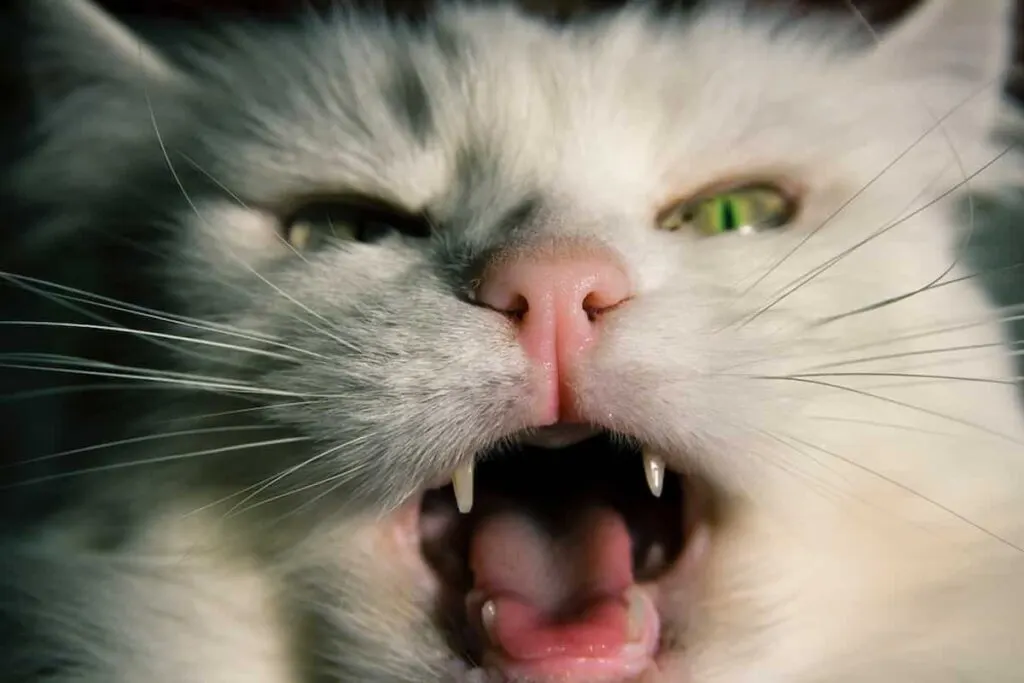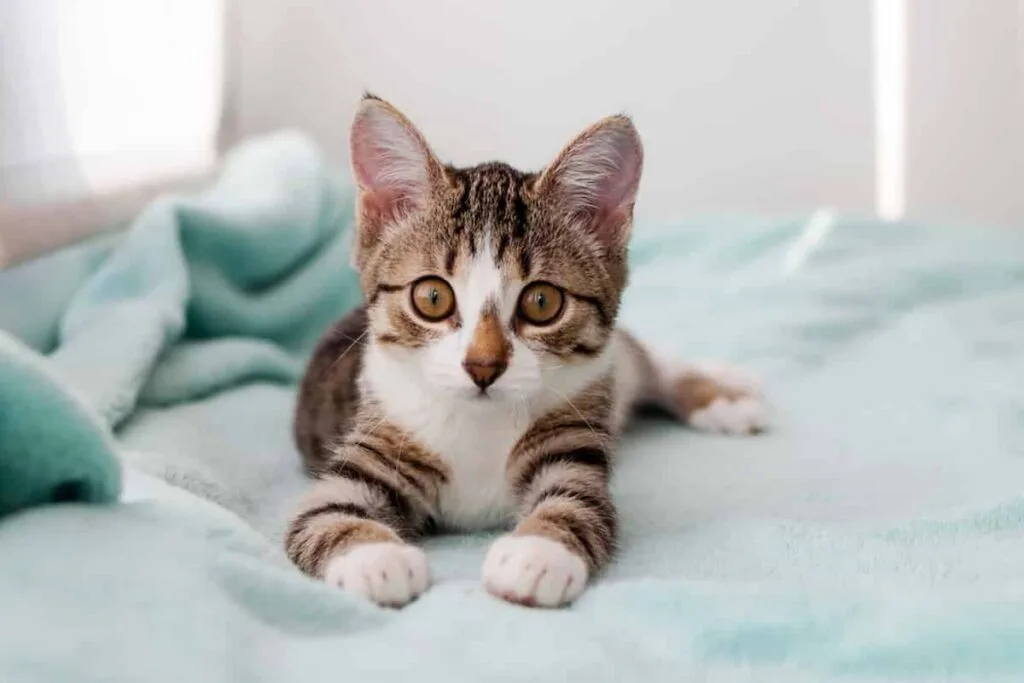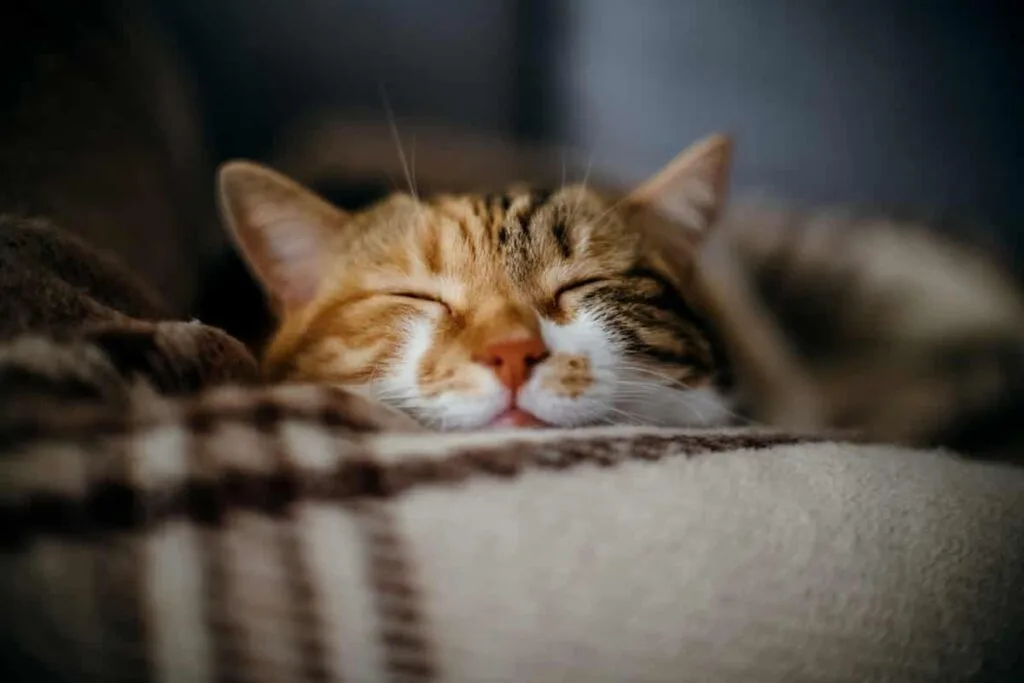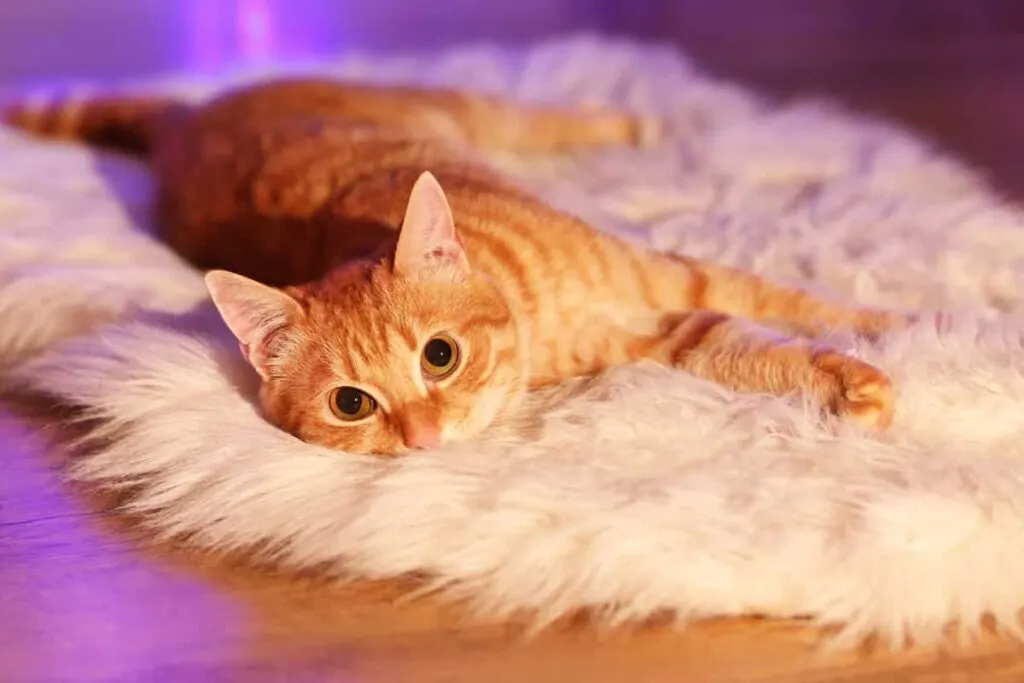We’ve all been there before. It’s 2 am, and your cat is going crazy, making odd, screeching noises. Some are normal meows, and others are unique sounds you’ve never heard. No fear, though; we can help you get some sleep! There are a few reasons why cats make weird noises at night.
So why is your cat making such weird noises at night?
Cats make noises at night due to cognitive dysfunction, crepuscular behavior, hunger, thirst, and emotional expressions such as stress or fear. Additionally, cats can make noises at night to express their emotions, and some cats don’t have control over their vocalizations.
Many factors go into why your cat makes weird noises at night. Some are fairly normal and easy to change. Others can lead to further feline issues. Below I’ll go over a few reasons I’ve found that could lead to your cat making weird noises at night.

Types of Noises Cats Make at Night
If your cat is making noises at night, it’s important to figure out what they mean. Not all meows or yowls will sound the same, so I’ve broken down a few of the most common ones you’ve probably encountered:
Meowing and Yowling
When your cat meows or yowls at night, it could be due to various reasons. For instance, they might be trying to communicate with you or other cats or experiencing discomfort or loneliness. Sometimes, their meows may be louder and more persistent at night, especially if they want your attention, food, or just have some excess energy to burn off.
Growling and Chirping
Your cat might also make growling or chirping sounds at night. Growling is often a sign of fear, anger, or even pain, so observing your cat’s behavior and checking for any signs of distress is essential.
On the other hand, chirping is a more playful sound that cats make when they’re excited. It might be that your cat has spotted a potential “prey” like an insect or toy, and they’re just having fun.
Mating Calls
Cats are known to make various weird noises during mating season. Unspayed or unneutered cats may emit loud yowls or growls to attract potential mates or establish dominance over other cats.
If your cat’s strange nighttime noises coincide with the mating season, it could be due to them expressing their natural instincts.

Cognitive Dysfunction Syndrome in Cats
CDS has a huge impact on cats making noises at night, especially senior cats. This disorientation can lead to the cat hollering and meowing in the middle of the night. Here’s a breakdown of the symptoms, as well as some tips to manage it if your cat is vocalizing excessively:
Symptoms and Effects on Vocalizations
Cognitive Dysfunction Syndrome (CDS) is a condition that affects senior cats, although younger cats can also be impacted. It shares similarities with dementia in humans and may result in various behavioral changes in your cat. Some common symptoms include memory loss, disorientation, changes in sleep cycles, and increased vocalization.
Increased vocalization, specifically making weird noises at night, can indicate that your cat is experiencing Cognitive Dysfunction Syndrome. As CDS progresses, it may affect your cat’s hearing, making them more likely to vocalize louder or more frequently to communicate or express discomfort. They might also become confused or disoriented, leading to unusual vocalizations at night.
Managing Cognitive Dysfunction Syndrome
To help your cat manage Cognitive Dysfunction Syndrome, it’s important to consult with your trusted veterinarian. They may recommend various treatments or interventions depending on the severity of your cat’s condition.
Some ways to help your cat feel more comfortable and alleviate symptoms include:
| Alleviating CDS Symptoms |
|---|
| 1. Maintain a consistent and predictable daily feeding, grooming, and playtime routine. |
| 2. Provide a calm, stress-free environment, and avoid sudden changes to their surroundings. |
| 3. Engage your cat in interactive play and mental stimulation to keep its mind sharp. |
| 4. Monitor your cat’s health closely and keep track of any changes in behavior or symptoms. |
It’s essential to remember that while you can make your cat’s life more comfortable and enjoyable, Cognitive Dysfunction Syndrome is a progressive condition.

Factors Affecting Nighttime Noises
Many factors can affect nighttime noises. This includes feeding, mating, and general stress and anxiety, just to name a few.
Hunger and Thirst
One reason your cat makes weird noises at night could be hunger or thirst. If their food and water bowls are empty, they might vocalize to let you know they need more sustenance. You can address this by providing them fresh food and water before bedtime and monitoring their daily consumption habits.
Mating and Reproduction
Cats’ vocalizations might be related to mating and reproduction behaviors. If your female cat is in heat, she will make specific sounds to attract male cats. Similarly, unneutered males can increase their vocalizations when they sense a nearby female in heat. To reduce these nighttime sounds, spaying or neutering your cat can be helpful.
Stress and Anxiety
Stress and anxiety can also cause your cat to make strange noises at night. Yowling and low growling sounds can signal a stressed or anxious cat. These sounds might be more noticeable at night due to the quiet, as stress-induced symptoms become more prominent. Addressing the source of your cat’s stress can help alleviate these nighttime sounds.

Changes in Routine or Environment
Cats are creatures of habit and can be sensitive to changes in their routine or environment. If you’ve recently moved or introduced new pets, such changes can trigger anxiety in your cat, leading to unusual vocalizations. Give your cat time to adjust and maintain their familiar routine to help them feel more comfortable.
Recognizing the factors that affect your cat’s nighttime noises can help you address their specific needs, creating a more peaceful environment for both of you.
New Living Areas
Moving to a new house can really stress a cat out. As previously mentioned, their becoming disoriented might attribute to their discomfort, but so can different surroundings.
Just think about sleeping in a new place for the first time. It’s difficult, right? It goes the same for your feline pets. New places lead to stress, which can lead to them verbalizing themselves, especially at night when you’re sleeping.
New Pets
Another stressor for a cat could be an addition to the family. As is with a routine, adding a new pet to the family can be tough for the original feline. Adding a new creature to its territory can cause the cat to stress itself out. The stress causes the cat to freak out and act abnormally, perhaps leading to loud yelps and meows in the middle of the night.
How to Quiet Your Cat Down
So now you’ve figured out the symptoms and the cause of your cat vocalizing itself at night. So, what do you do? It’ll depend on the issues with the cat, but there are always remedies you can try to calm your cat down.
- A Familiar Place: Try surrounding the cat with a common setting. A cat in a new place is a big issue. If you’re moving to a new place, try to bring a piece of furniture the cat loves. If you’re buying new furniture, try placing a favorite blanket on the new couch or seats.
- Routine: A new routine is detrimental to a cat. However, have no fear! You can adjust it accordingly to help ease the cat into the new schedule. Try slowly weaning their dinner times. If the new dinner time is later, try feeding them an hour or two later and slowly progress to the new schedule. This should help the cat adjust to their new schedule.
- Safe Places: Be sure to give them plenty of space while also being conscious of large doorways or staircases. If a cat is disoriented, having various rooms open and staircases accessible can become dangerous or daunting.
In addition to the above suggestions, here are a few more methods that I’ve tried with my cat Harley that worked well, especially when he was younger:
Changing Feeding Schedule
Adjusting your cat’s feeding schedule may also help reduce their weird noises at night. Cats tend to be more active when they’re hungry, so consider providing them with a small meal before bedtime. This will help to keep them satisfied during the night and reduce their need to vocalize or search for food.
Training and Socialization
Training your cat and giving them proper socialization can help with their nighttime behavior. Younger cats may be more prone to making weird noises at night due to their high energy levels and curiosity.
Teach them to play quietly and redirect their energy towards constructive activities, such as playing with toys, during the daytime. This can help to minimize their restlessness and reduce the likelihood of them making strange noises at night.
Consider getting your cat spayed or neutered, as this can help curb mating-related behaviors that lead to nighttime vocalizations. Additionally, adequate social interaction can help your cat feel more secure and relaxed at night, reducing the need for them to reaffirm their territory by making noises. The combination of training, socialization, and a regular routine can greatly reduce the nighttime noises your cat makes.

My name is James, and welcome to FAQCats!
Along with our team of cat owners, expert pet enthusiasts, and pet professionals, we aim to write engaging helpful, engaging content about cats. At FAQCats we strive to provide content that’s accurate and fun to read. Our team writes about everything related to cats; even the most complex of topics. Through extensive research and caring for our own fur-pals, we’re able to provide something cat owners worldwide will love. Have a look around, and leave us feedback anytime!

